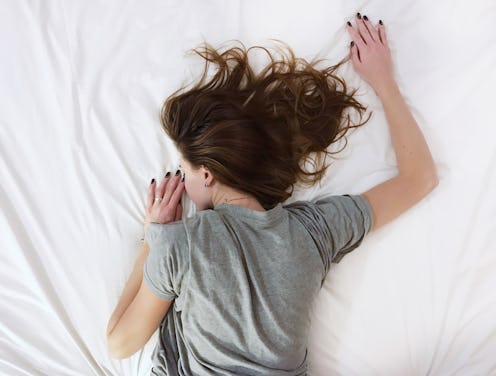Life
Why You Might Have Trouble Sleeping After The Solar Eclipse
Normally, insomnia happens before a major event. Kids can't sleep before Christmas, I can't sleep before International Women's Day — you get the idea. But unbridled anticipation doesn't explain why anyone would have trouble sleeping after the eclipse on Monday. Honestly, you'd think that after all the excitement of watching the moon blot out the sun, sleep would come sometime between flopping onto your bed and closing your eyes. Judging from how many people complained of insomnia on Monday night, though, it isn't that easy. So what gives?
First of all, there's no research directly linking eclipses with poor sleep — a niche subject if there ever was one. However, previous research could go some way toward explaining insomnia the night after an eclipse. For one thing, you may have noticed that solar eclipses, particularly one as historic as Monday's event, don't just leave people excited; they become downright giddy. That kind of thrill causes the body to release cortisol and adrenaline, both of which increase alertness. Stress responses last as long as the "threat," or in this case, the source of excitement, is perceived. If you keep thinking about the eclipse and getting yourself all worked up around bedtime, your journey to dreamland may take longer than usual.
It's also worth noting that other animals are terribly confused by solar eclipses. Research has shown that species including spiders and bees begin their nighttime routines during an eclipse, and zoo animals have been known to act strangely when the sun goes dark. Totality only lasts for a few minutes at most, but combined with the excitement of the day, it's possible that your ciradian rhythm is a little off as a result of the eclipse.
Finally, believe it or not, research has actually shown that the lunar cycle influences human sleep patterns, regardless of whether they're aware of the phases of the moon at the time. In 2013 and again in 2016, a study found that over the course of four years, volunteers consistently reported poorer sleep during the full moon. Admittedly, a solar eclipse is pretty much the opposite of a full moon, which occurs when the Earth is between the sun and moon. In fact, considering the moon is only ever 100 percent full during a lunar eclipse, the case could be made that a total solar eclipse is a new moon in the extreme.
But if the lunar cycle influences your sleep quality, which research has shown as a possibility, it's not unreasonable to think that the moon's path in front of the sun would have a similar effect.
In all likelihood, there's no single reason for sleep troubles after the eclipse. It may be a combination of factors: anticipation, adrenaline, and maybe even the lunar cycle. The good news is that these are all temporary, so things should calm down soon. Grab some chamomile tea and a good book tonight, and you should be snoozing in no time.
